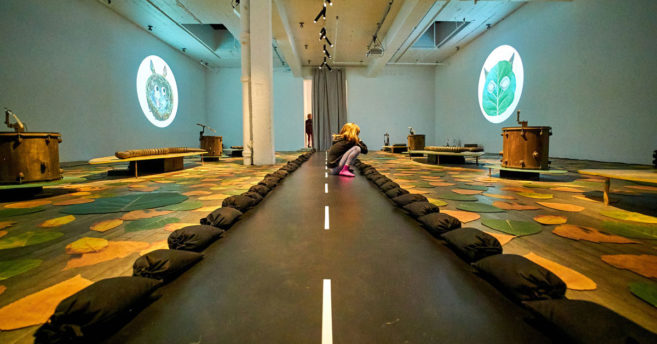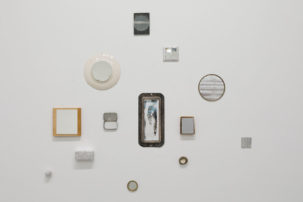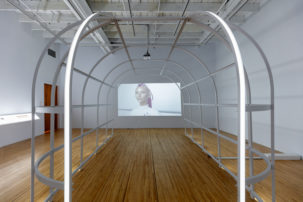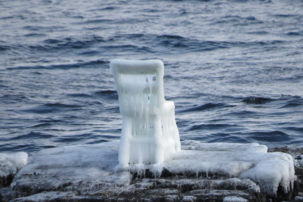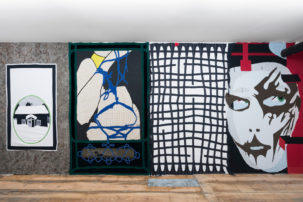For his exhibition “Please Don’t Go (09:01 December 22, 1977 – )” at the New Gallery in Calgary, Stephen Mueller redesigned the presentation of an idea he first pursued in 2005. This glossy new work consisted of a rectangular, self-illuminating glass box designed to accommodate the artist’s body. When the gallery was open—which it typically is for five days a week, six hours a day—the artist could be seen inside his glowing human-art farm. Sometimes he sat. Other times he knelt. For each six-hour stint Mueller painstakingly cut out tiny dots of Braille from a roll of paper stretching across the gallery floor. Once each dot was cut it was placed into one of 24 glass specimen dishes. In moving around the box, viewers realized that the glass walls were one-way mirrors and that the artist could not see out; thus he worked in reflective seclusion.

| |
|
Stephen Mueller “Please Don’t Go (09:01 December 22, 1977 – )” 2010 Courtesy the artist and the New Gallery / photo Noel Bégin |
In part, Mueller viewed his durational performance as a way to focus his mind upon the present. By doing so, he had hoped to reduce his obsessive anxiety about a vanishing past and a finite future. Don DeLillo writes in White Noise, “Does knowledge of impending death make life precious?” Conversely, in Mueller’s work, Did an obsession with the precious allow the artist to bypass awareness of impending death? In the end, Mueller notes his box reflected his confinement in what could be described as a gorgeous, mirrored coffin. All this shine and solidity did little to reduce the riptide of anxiety the artist felt, and likely would continue to feel. Mueller was aware of this, which is why he also considered the work a physical representation of psychological futility.

| |
|
Stephen Mueller “Please Don’t Go (09:01 December 22, 1977 – )” 2010 Courtesy the artist and the New Gallery / photo Noel Bégin |
A second resonating concept of “Please Don’t Go” was the manner in which it acted as a metaphor for online social networks. Approaching the art was like logging onto Facebook—viewers had to first engage in a brief disambiguation, namely that this reflected person was the Windsor-based performance artist Stephen Mueller, not the New York City painter who shares the name. Next, viewers scrutinized the artist, who organized his content without acknowledging their presence. Online, this dynamic is called creeping or lurking. Similarly, the piece may relate to another hallmark of our time. In this work, Mueller was figuring out and articulating this strange contemporary territory where, just as English transformed into Braille becomes illegible to most people, rapid digital advances challenge ideas of private identity and public consumption. By remaining inside something small, Mueller was definitely onto something big.



